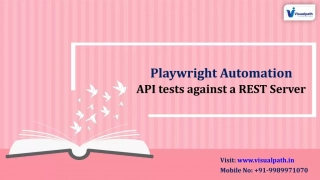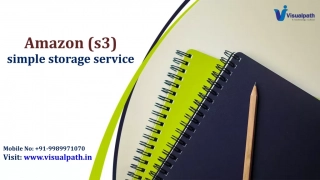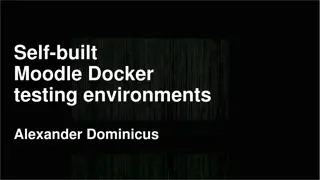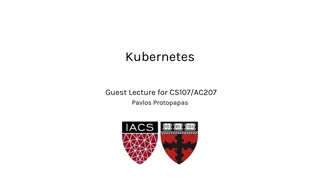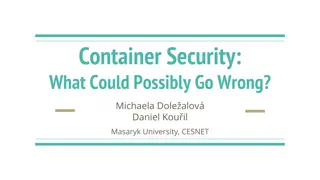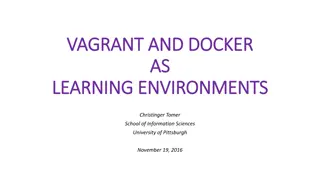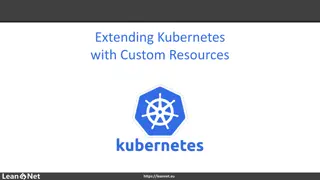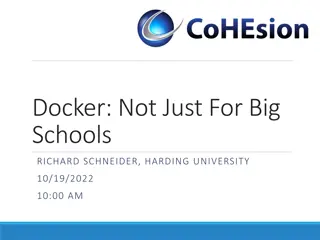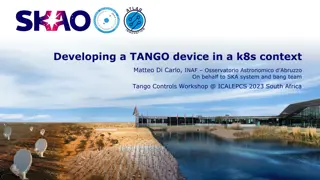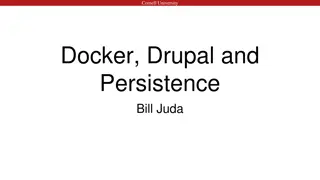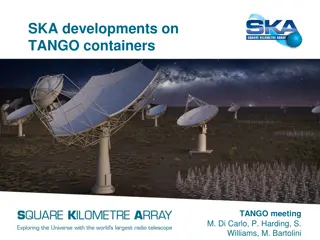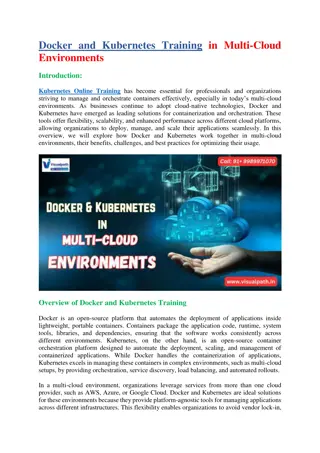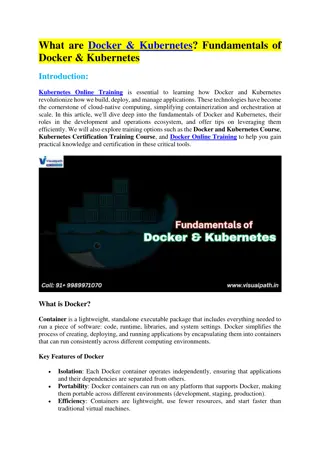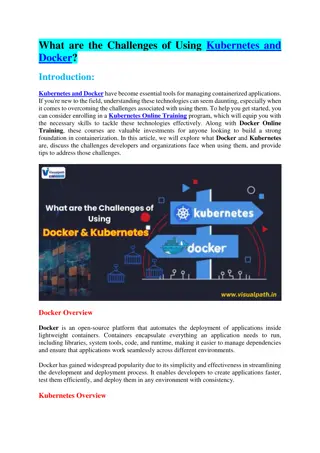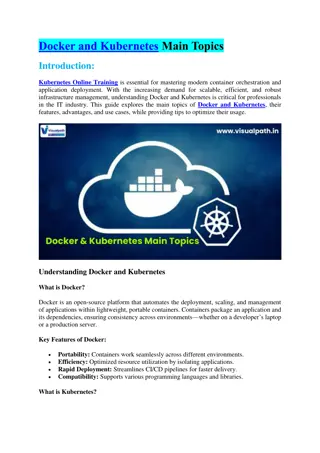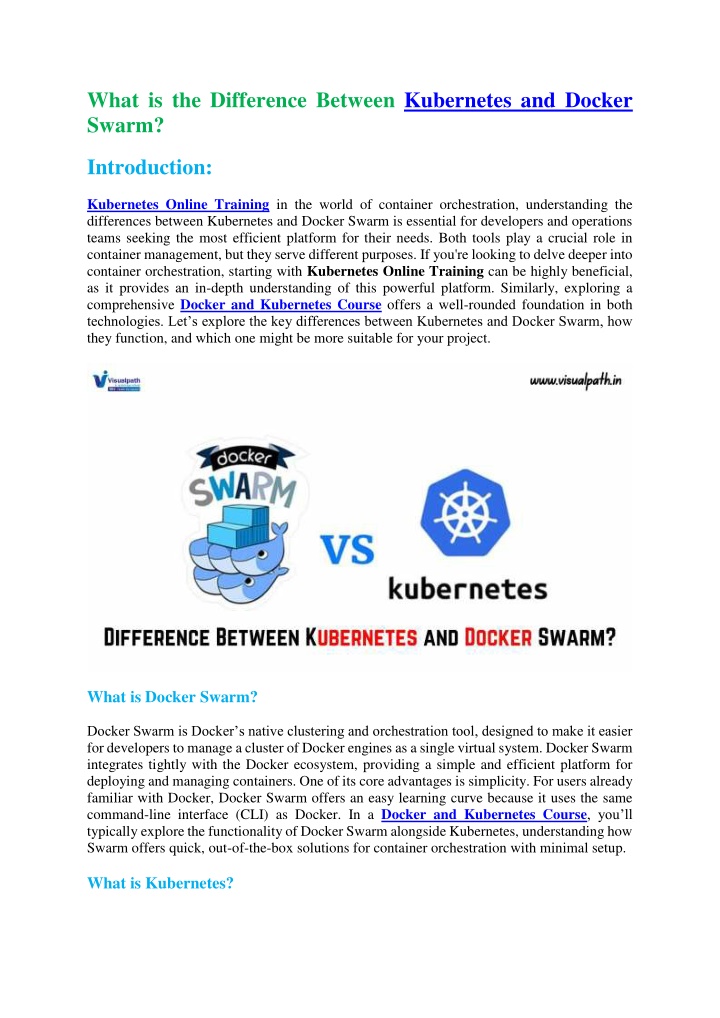
Docker and Kubernetes Training in Hyderabad - Visualpath
Visualpath delivers top-notch Docker and Kubernetes Courses led by real-time experts. For more information, call 91-9989971070 todaynVisit: // /online-docker-and-kubernetes-training.html
Uploaded on | 1 Views
Download Presentation

Please find below an Image/Link to download the presentation.
The content on the website is provided AS IS for your information and personal use only. It may not be sold, licensed, or shared on other websites without obtaining consent from the author. If you encounter any issues during the download, it is possible that the publisher has removed the file from their server.
You are allowed to download the files provided on this website for personal or commercial use, subject to the condition that they are used lawfully. All files are the property of their respective owners.
The content on the website is provided AS IS for your information and personal use only. It may not be sold, licensed, or shared on other websites without obtaining consent from the author.
E N D
Presentation Transcript
What is the Difference Between Kubernetes and Docker Swarm? Introduction: Kubernetes Online Training in the world of container orchestration, understanding the differences between Kubernetes and Docker Swarm is essential for developers and operations teams seeking the most efficient platform for their needs. Both tools play a crucial role in container management, but they serve different purposes. If you're looking to delve deeper into container orchestration, starting with Kubernetes Online Training can be highly beneficial, as it provides an in-depth understanding of this powerful platform. Similarly, exploring a comprehensive Docker and Kubernetes Course offers a well-rounded foundation in both technologies. Let s explore the key differences between Kubernetes and Docker Swarm, how they function, and which one might be more suitable for your project. What is Docker Swarm? Docker Swarm is Docker s native clustering and orchestration tool, designed to make it easier for developers to manage a cluster of Docker engines as a single virtual system. Docker Swarm integrates tightly with the Docker ecosystem, providing a simple and efficient platform for deploying and managing containers. One of its core advantages is simplicity. For users already familiar with Docker, Docker Swarm offers an easy learning curve because it uses the same command-line interface (CLI) as Docker. In a Docker and Kubernetes Course, you ll typically explore the functionality of Docker Swarm alongside Kubernetes, understanding how Swarm offers quick, out-of-the-box solutions for container orchestration with minimal setup. What is Kubernetes?
Kubernetes, on the other hand, is a more complex and comprehensive container orchestration platform developed by Google and now maintained by the Cloud Native Computing Foundation (CNCF). It provides a highly scalable, robust system for automating the deployment, scaling, and operation of containers across clusters of machines. Kubernetes has become the industry standard for container orchestration due to its flexibility and its vast array of features, including self-healing, automated rollouts and rollbacks, and service discovery. Kubernetes Online Training covers the advanced features of Kubernetes, including its architecture and key components like Pods, Nodes, and the Kubernetes Control Plane, offering deeper insights into managing large-scale, distributed applications. Key Differences Between Kubernetes and Docker Swarm 1.Complexity and Learning Curve: Kubernetes has a steeper learning curve compared to Docker Swarm. While Swarm is easier to set up and more straightforward to use, Kubernetes requires more knowledge of its architecture and components. This makes Kubernetes Online Training essential for those looking to master it. Kubernetes is more suitable for complex, production-level environments where scalability and reliability are crucial, while Docker Swarm is ideal for simpler, smaller-scale deployments. 2.Networking: Kubernetes uses a flat networking model, which allows each Pod (group of containers) to communicate with each other across Nodes without the need for Network Address Translation (NAT). Docker Swarm, by contrast, uses a more simplistic approach to networking, relying on an overlay network for container communication. In a Docker and Kubernetes Course, these differences are highlighted, helping learners understand which platform fits their networking needs. 3.Scalability: Kubernetes excels in scalability. Its architecture is designed to manage thousands of containers across clusters with ease. The platform automatically adjusts the number of running containers to meet the needs of the application. Docker Swarm can scale too, but it does not offer the same level of control and automation as Kubernetes. When participating in Kubernetes Online Training, you will often encounter real-world scenarios where Kubernetes' advanced scaling features provide significant benefits to large-scale applications. 4.High Availability: Both Kubernetes and Docker Swarm provide high availability, but Kubernetes has a more mature system. Kubernetes ensures that the desired state of applications is maintained at all times, even during failures. Swarm provides redundancy, but Kubernetes has more robust self-healing capabilities. In a Docker and Kubernetes Course, you ll explore these high-availability mechanisms and how they help in creating resilient applications. 5.Load Balancing: Kubernetes automatically provides load balancing between containers, and it integrates more sophisticated load-balancing policies. Docker Swarm s load balancing is simpler, mainly balancing between services. Kubernetes Online Training often covers how to set up and manage these advanced load-balancing techniques, which can be critical for large-scale applications requiring optimal performance. 6.Deployment Management: Kubernetes supports automated rollouts and rollbacks, which ensures that your application can be updated without downtime. Docker Swarm offers more basic deployment strategies, with fewer customization options compared to Kubernetes. Understanding these deployment differences is an essential part of any Docker and Kubernetes Course, allowing users to pick the right tool for their specific deployment needs.
Which One to Choose? The decision between Kubernetes and Docker Swarm comes down to your project requirements. If you need a simple, easy-to-use platform for smaller, non-complex projects, Docker Swarm is a good choice. Its tight integration with Docker and user-friendly CLI makes it a great option for quick, smaller-scale deployments. However, if your project requires high scalability, robust automation, and a highly reliable infrastructure, Kubernetes is the better option. Tips for Managing Kubernetes and Docker Swarm Start Small:If you re new to these platforms, begin by deploying simple applications before scaling up. Kubernetes Online Training usually covers hands-on labs where you can practice deploying applications in a controlled environment. Use Monitoring Tools: Kubernetes has native tools like Prometheus for monitoring your clusters, while Docker Swarm integrates easily with Docker's native monitoring tools. A Docker and Kubernetes Course often includes tips on setting up these monitoring systems to ensure your applications run smoothly. Automate Scaling:Take advantage of Kubernetes automatic scaling capabilities. In Kubernetes Online Training, you ll learn how to configure auto-scaling based on application performance metrics to ensure your applications can handle varying loads. Conclusion In conclusion, Kubernetes and Docker Swarm both offer robust solutions for container orchestration, but they cater to different needs. Kubernetes provides a feature-rich platform suited for large, complex deployments with a focus on scalability and automation. Docker Swarm, on the other hand, offers a simpler and faster option for smaller, less complex projects. Choosing between them requires a careful assessment of your project s demands. Investing in Kubernetes Online Training or a Docker and Kubernetes Course can provide the foundational knowledge and skills needed to effectively utilize these powerful tools. Visualpath is the Best Software Online Training Institute in Hyderabad. Avail complete Docker and Kubernetes worldwide. You will get the best course at an affordable cost. Attend Free Demo Call on - +91-9989971070. WhatsApp: https://www.whatsapp.com/catalog/919989971070/ Visit:https://www.visualpath.in/online-docker-and-kubernetes-training.html



